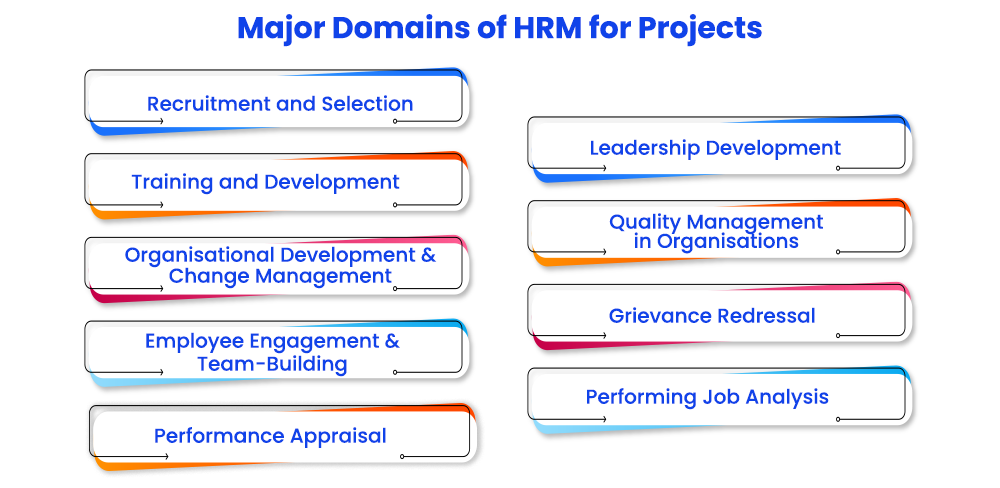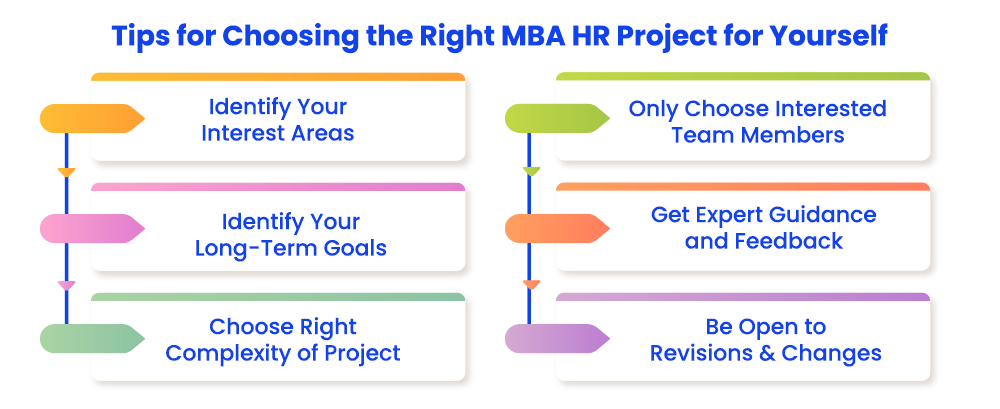Expert Interviews
- University Reviews
- Career Guide
 Video Counseling
Video CounselingImportant Facts
- Ask any Question - CV Forum

20 Latest MBA HR Project Ideas & Topics for Beginners [2026]
College Vidya Team Jan 22, 2026 18.3K Reads

When it comes to selecting the right project idea or an interesting domain to prepare a management project on, students, especially beginners, may find themselves at a loss of unique ideas or breakthroughs. The result of this is a mere repetition of a project idea that is a mere replication of topical areas explored before on numerous instances.
In an MBA in Human Resource Management, students may often be asked to create assignments and work on detailed projects as part of their curriculum. Selecting a unique topic is important both to portray an originality of ideas as well as stay motivated throughout the course of the project. You may Interested | MBA Online Course In Human Resource Management.
In this blog, we have curated a list of 20 unique and interesting project ideas in the domain of human resource management for beginners to explore, so continue reading if you are looking for some inspiration to begin your term project!
What is MBA Human Resource Management?
Before we discuss the major topical project areas that one can explore if they are pursuing an MBA in Human Resource Management, it is important to have a preliminary understanding of what encompasses HRM.
An MBA in Human Resource Management is a postgraduate degree course in management, with a specialisation in the domain of human resource management. According to Armstrong (2008), human resource management is a “strategic and coherent approach to the management of an organisation’s most valued assets–the people working there who individually and collectively contribute to the achievement of its objectives.”
At its very essence, HRM deals with the employees, i.e. the personnel or the human assets of any organisation for their effective and optimal functioning and performance at work and their interpersonal relationships with each other, all aimed at enhancing their experiences at work as well as the productivity and success of the organisation. Also Available | Master of Business Administration (MBA) Online.
Thus, HRM as a discipline deals with aspects like recruitment, selection, training, learning and development of employees, team-building, stress management of employees, job analyses, conducting performance appraisal, incentivising and compensating employees and so on.
Major Domains in MBA HRM
It is a good idea to have a general understanding of the major domains of HRM, as one can select a project idea in any of these domains to explore further and design their entire research project around. A project in an MBA HRM degree is aimed at enhancing the practical and application skills of the student, so that they can understand the learnt theoretical concepts and theories in the light of actual case studies, processes and incidents in various industries.

So selecting a topic that is interesting, explored limitedly and offers scope for new insight generation is important. Some of the pertinent domains related to HRM that one can accordingly choose a project in have been mentioned herewith:
- Recruitment and Selection: This is one of the primary areas a beginner can explore for projects in an MBA. Whether it be the existing recruitment policies, the patterns and trends in recruitment and selection in various industries or the underlying assumptions and beliefs that underpin recruitment and selection in an organisation, this domain is ripe with ideas and project areas to explore further.
- Training and Development: While recruitment and selection mark the beginning of the journey of an employee in an organisation, appropriate training and induction of such employees into the organisation and job role is essential to ensure high employee engagement-this is where the training and development role of HR departments becomes central. Students can explore various aspects in this arena in their project such as policies and strategies used by companies, the new developments in training and development in light of virtual workspaces etc.
- Organisational Development and Change Management: Change being inevitable in companies, change management and consequent organisational development are two aspects all HRM students must be well-versed in, as it has important implications for the employees and the company’s functioning. While already vastly explored, students of management can find newer avenues to explore such as the role of virtual change management, OD in virtual companies, role of leadership in change management and OD etc.
- Employee Engagement & Team-Building: Employee engagement is central to ensuring that the human resources of a company have an optimal experience in their work-life, further contributing to enhanced productivity, heightened creativity and innovation, and ultimately greater growth for the company. Similarly, the interpersonal relationships one has with their team members contributes to professional well-being and engagement with the job. Students can explore this arena in-depth and find creative arenas of projects like employee engagement practices in unconventional industries, team-building in diverse teams, team-building for virtual teams and so on.
- Performance Appraisal: Performance appraisal, its strategies, the fairness of the procedures, their reliability, utility and skills have been long-researched areas in HRM. Beginners can start exploring these conventional areas to come up with their unique ideas, such as strategies to develop fairer performance appraisal procedures, role of employees’ performance appraisal in their job engagement, role of favouritism and eliminating favouritism in performance appraisal etc.
- Leadership Development: Central to the long-term success of any company is the leadership leading the rest of the company members towards realising the vision of the founders. Thus, identifying potential leaders and training and developing them for their personal lives and professional responsibilities in becoming a leader is essential. HRM students can explore project ideas related to developing women leaders, empowering minority members to develop leadership skills, developing measures for leadership competency mapping etc.
- Quality Management in Organisations: Quality management is a less-explored area in HRM studies, although it does make a pertinent domain to explore through a detailed project in a curriculum of MBA. Considering that employees and human processes in a company are central to affecting the quality of services and functioning of the company, HRM students can explore this arena in detail through their projects.
- Grievance Redressal: Grievance redressal is becoming an area being given increasingly more importance owing to the rising recognition of human rights at the workplace. HRM as a discipline is also exploring newer arenas in this respect–be it grievance redressal of aspects not much addressed earlier, or developing fairer and safer mechanisms to address the grievances of employees. Grievance redressal is a potent area for exploring through a detailed project and can provide a valuable addition to one’s resume and portfolio.
- Performing Job Analysis: Performing regular job analysis, developing job descriptions and developing standards for performance appraisal on those specific job roles is a part of the regular work responsibilities of HR specialists. Thus, beginners in the field of MBA HRM can also explore this arena for a project to explore depths of processes and principles for performing job analyses, basis for conducting a job analysis, policies underlying criteria for judgement of performance standards etc.
Thus, it can be clearly seen that HRM as a field is a mine of ideas and domains to be explored through projects. Students can consider case studies for analysis, design their own interventions, critically examine strategies and procedures of HRM in practice etc. as part of their full-term project in an MBA. Click Here | Top 10 MBA Colleges In Data Science and Analytics.
Top 20 Unique MBA HR Project Ideas for Beginners
Here we have listed 20 unique ideas to explore if you are an MBA student pursuing Human Resource Management (HRM) as a specialisation area. These project areas are vast, diverse and at a manageable level of difficulty for beginners.
They can help you explore the field of HRM to gain practical insights and hands-on skill development while becoming a valuable addition to your portfolio for the future.
1. Job Satisfaction across Different Age Groups in Workforce
 An interesting and concise arena to explore for beginners in an MBA HRM can be to see job satisfaction of employees in organisations, and further assess the profiles of job satisfaction among employees from varying age groups. Modern workspaces have become increasingly diverse with respect to the demographic characteristics of the workforce.
An interesting and concise arena to explore for beginners in an MBA HRM can be to see job satisfaction of employees in organisations, and further assess the profiles of job satisfaction among employees from varying age groups. Modern workspaces have become increasingly diverse with respect to the demographic characteristics of the workforce.
As younger individuals are joining professional spheres to gain professional skills whilst older employees are finding flexible working options even after years of retirement, multiple generations of employees can be found working together in the same vertical, team or division in companies.
Also Available | Part Time MBA Courses In India
Thus, a study that explores the degrees of job satisfaction in employees across various age groups can provide a student the experience of administering and evaluating the job satisfaction of employees as well as gain insights about the differences in job satisfaction for employees from various generations. Further innovations within the same project can include:
- Assessing the job satisfaction with respect to age in different industries
- Assessing job satisfaction of employees across age groups across cultures
- Assessing job satisfaction of employees across age groups considering work facilities available to them
2. Analysis of Factors Affecting Employee Satisfaction in the Modern Corporate Sector
While the earlier project idea focused majorly upon the job satisfaction of employees with respect to age, there can be a vast number of factors affecting the satisfaction one experiences in a particular job. Also Available | MBA Distance Learning.
An excellent and comprehensive project idea in this respect can be to conduct a meta analysis of the multitude of factors contributing to or diminishing job satisfaction of employees. A few of the pertinent factors that can be considered for study include:
- The demographic profile of employees including their age, gender, socioeconomic status, years of professional experience, nationality/ethnicity etc.
- The industry in which job satisfaction is being assessed
- Compensation, rewards and incentive policies of the company
- The state of the company with respect to success and flourishing
- Leadership in the company
- Employee interpersonal relationships at the workplace
- Work responsibilities and hierarchical position in the company
- Aptitude-job fit of employees and their work responsibilities
3. Job Commitment and Employee Branding in Emerging Companies
An interesting domain that can be explored through a research project in MBA HRM is the relationship that exists between the job commitment of employees (i.e. their degree of commitment and sense of belongingness with the organisation) in an organisation and their employee branding (i.e. their tendency to be brand ambassadors for the organisation) tendencies. Also Read | 10 Most Affordable Online MBA Colleges in India.
While intuition suggests that employees who have a greater job commitment to the organisation would also be more likely to positively brand the organisation to others, the relationship is actually more complex, privy to be affected by a number of other factors, of which the company’s period of establishment can be a crucial factor.
So studying how committed employees of an emerging company is and the extent to which they are willing to positively brand the company to others can be useful for an HRM student to gain insights not only about human behaviour but also marketing strategies that can be used to strengthen employee branding practices for the company.
4. Employee Grievance Redressal in the Modern Workplace
As already mentioned erstwhile, effective grievance redressal is becoming an increasingly recognised and valued aspect of effective HR practices and corporate culture in the modern workplace. With rising recognition of employee rights and vocalisation against unfair practices, it has become essential for HRM students and professionals to be up to date with recent developments and fair practices for grievance redressal. You May Interested | Online Executive MBA
Thus, an MBA HRM student can work on a detailed project in this domain in the form of a case study of an organisation, a meta analysis of current strategies and practices in the corporate sector etc. Certain interesting aspects to look into in this domain include:
- Cross-cultural practices and policies of grievance redressal in organisations
- Grievance redressal practices and policies across various industries
- Fairness of grievance redressal policies in modern workplaces
- A case study of the lapse of effective grievance redressal and its implications
5. Gender Inclusivity at the Workspace
Another pertinent issue that is gaining recognition in the contemporary organisational settings is the gender diversity and importance of gender inclusive practices in the professional sphere. Gone are the days when the society functioned merely from a gender-binary perspective, now, there is rising recognition, representation and awareness about the lives of individuals from the broad spectrum of gender identities.You May Interested | MBA online for IIMS
Professional spheres are also catching up with the same development with pace, and thus, it has become more important for HR personnels and specialists to understand the need for updated gender-inclusive policies, work practices as well as barriers to implementing the same.
Thus, assessing or reviewing existing workplace practices in organisations and seeing whether they promote gender inclusive practices and environment or not can not only be a highly regarded addition in one’s portfolio but also a socially responsible academic endeavour.
6. Women Leadership and Barriers to Gender Equality at Higher Organisational Positions
While the visibility of women in leadership and top executive positions has undoubtedly increased over the past years, there are still a number of barriers that exist for women to escalate in their careers over the corporate ladder. Some of these challenges can be quite overt, such as power politics, outright discrimination (rare) or favouritism and biases, some of these effects can be quite subtle and hard to observe such as the glass cliff phenomenon, the glass ceiling phenomenon etc. Also Read | MBA Full Form
It is important for HR specialists and students to explore such issues not only to identify current loopholes in leadership training and performance appraisal practices, but also to identify potential future women leaders and effectively train them to take up and manage power positions efficiently. Projects in this domain can more specifically explore:
- Common barriers for women to attain leadership positions
- Role of networking in effective career escalation for men and women
- Biases against women leaders across various industries
- Cross-industrial comparison of women leaders and their representation
- Gender comparison of leadership effectiveness etc.
7. Addressing Social Inequalities and Diversity-Inclusive Practices

In the globalised workspace, especially with the advent of technology that connects people across time zones and national boundaries in split seconds, there are individuals from diverse backgrounds with respect to age, gender identity, socioeconomic status, ethnicity, race, region and so on working together. Click Here | Career Options After MBA.
In such a shared working space, creating a safe and accepting environment to promote inclusivity for employees from diverse backgrounds is important for upholding employee rights, well-being and fostering creativity and innovation in the company.
Exploring HR practices in modern organisations regarding inclusivity of employees from diverse backgrounds can be an interesting and insightful project idea for a beginner in the domain of HRM. A simple exploration of the existing practices for fostering social equality at the workplace, a meta analysis of existing literature in this domain, a critical review of a case study with respect to diversity-inclusive work practices etc. are just a few of the ideas that can be taken up as projects.
Some important areas of social diversity that can be explored through this project include:
- Systems like caste and class affecting recruitment and selection chances
- Gender diversity and inclusive practices in the professional domain
- Age-related diversity and fostering amicable intergenerational relationships
- Diversity-inclusive practices for racial and ethnic differences in the workforce
- Inclusive practices for cross-cultural differences in MNCs etc.
8. Career Progression of Minority Sections in the Modern Corporate World
Developing a successful career for members of minority sections of the society is no easy task even in the 21st century. While equality and egalitarian practices are taking centre-stage in recent times, there are still many setbacks and roadblocks for career establishment for individuals belonging to minority social sections, especially if those sections are among the less powerful ones in the society.
Even within an organisation, there may be overt and unobservable aspects leading to the differential career progression of employees from a minority background. This can include unsaid biases and prejudices, hostile work environment, lack of inclusive practices etc.
HRM students can explore this aspect through a project in the form of detailed audits, surveys or case study and critical reviews. Overall, this can be quite an insightful project idea for those interested in venturing into grievance redressal or policy formation roles in their careers. Also Read | What Are the Most Popular MBA Specializations?
9. Challenges of Mergers and Acquisitions from an HRM Perspective

Mergers with other firms and acquisitions of companies come with many unique HRM challenges of their own. Whether it be the challenge of effectively merging the cultures of the merged companies or the process of developing uniform compensation and rewards policies for employees from the two firms, the HR department surely has a major task in organisational change during mergers and acquisitions.
|
|
|
|
|
|
|
|
|
|
|
|
|
|
|
|
|
|
This process can encounter many hurdles for HR specialists, which can be studied through a project on the same at the MBA level. Pertinent domains that can be explored include:
- Establishing uniform policies for compensation and rewards for employees of merged/acquired firms
- Training needs assessment after the merger/acquisition
- Leadership Development needs after mergers/acquisition
- Need for diversity analysis, culture due diligence, cultural surveys before mergers and acquisitions etc.
10. Relationship between Effective Selection and Training Needs in Employees
Recruitment and selection are processes primary to ensuring that the right candidates who are well-suited for a job are hired in the company. Effective selection requires thorough training for HR specialists as well as use of updated and efficient strategies. After candidates are hired for a new job role or position, it is also of importance to induct them into the organisation as well as the job role, provide them an orientation and a training as required.
An interesting project for an HRM student in an MBA course is the exploration of how the selection and hiring practices in an organisation are related to the training programs and drives needed for the new hires. Effective training should minimise the resources and time companies are required to spend on the training of new hires.
A meta analysis of practices in companies as well as the training requirements can help a student to explore the depths of the topic as well as the relationship between the two.
Further ways in which the study can be modified include:
- An industry-wise comparison of the relationship between selection and training needs in companies
- Examining the recruitment and hiring practices which are most effective and minimise training needs in companies
- Further examination of the relationship between employee demographics and effectiveness of hiring practices and training needs
11. Performance Appraisal and Evaluation in Virtual Workspaces

Performance appraisal is one of the most crucial work responsibilities of an HR professional and is a high stakes process since the career evaluation, promotion opportunities and in some cases the continued tenure of an employee is dependent on the performance appraisal they receive.
This process is crucial and can be explored by an HRM student not only to complete an interesting project but also to gain a deeper understanding of the process of performance appraisal before venturing into the professional fields.
The process of performance appraisal becomes a further complex one when organisations are working remotely, in the virtual mode, since in these cases the employees and subordinates of a manager or leader are separated in space (and in time in case of international teams and functioning), making it hard to supervise them or evaluate how effectively they are performing their job responsibilities.
An MBA HRM student can explore performance appraisal processes in the virtual workspace. They can explore existing strategies being used by remotely functioning companies, or work upon developing their own unique strategies. Case study analysis can also be done in this project.
12. Meta Analysis of Performance Appraisal Processes & Policies
Students can also explore different performance appraisal processes and policies in general across workspaces in various functioning modes or across industries. Since performance appraisal is a high stake process, there are a number of domains in this arena that students can work upon further to provide new insights and understandings.
Performance appraisal not only has direct impacts on the evaluation of an employee but also has a number of indirect impacts such as the perceived fairness of the procedure by employees, impact on the interpersonal relationship between supervisors and subordinates, the job satisfaction one experiences on the job, turnover and so on. Students of MBA HRM can explore the following arenas further with respect to performance appraisal and evaluation:
- A meta analysis of the existing practices in various HR departments for performance appraisal and evaluation
- An exploratory project on new and unconventional strategies for performance appraisal such as 360-degree appraisals, gamification of evaluation and appraisal etc.
- Perceived fairness and equity in evaluation processes as experienced by employees in companies
- Examination of potential biases, prejudices and personal favouritism affecting performance appraisal
- Examination of performance appraisal procedures across industries etc.
13. Assessing Effectiveness of Employee Retention Policies
Employee retention is one of the crucial aspects of the successful functioning and thriving of a company as it is important for retaining the talent and human resources in the organisation and maximising on their skills, experience and insights. However, retaining skilled employees in the modern volatile, uncertain, complex and ambiguous world is a tough task, as there are endless job opportunities out there in the professional world and the modern workforce is often quite agile and shifting firms to explore better and more rewarding opportunities.
Thus, a prime task that HR needs to focus upon is the retention of employees and talent within the organisation. MBA HRM students can explore this arena through projects to study the existing practices and policies companies and firms have for employee retention as well as employee engagement. Students can work on specific project domains like:
- Employee retention policies and practices in a specific industry or across industries
- New and unconventional policies and reward systems for employee retention
- Role of incentives and rewards in employee retention
- Influence of leaders in employee retention
- A critical review of current HRM practices for employee retention–their loopholes and possible future directions
14. Leadership and its Role in Organisational Processes

Leadership and leadership development are central aspects to effective organisational functioning and HR specialists have a central role to play in leadership development as well. As an HRM student, a learner can explore various areas related to leadership effectiveness to gain an understanding about the role HR specialists can play in furthering the leadership skills of employees.
The role that leaders play in influencing various sectors and processes in an organisation are diverse and important, considering both their authority position and followership may lead employees to comply with them. Thus, it is important to identify the influence that leaders have on organisational processes. Here are certain unique domains one can consider exploring further in this direction as a full-fledged project:
- Role of leadership training in enhancing leadership skills in employees
- Assessing Toxic Influence by Leaders on employees
- Studying leadership style and consequent employee compliance
- Understanding the role of leaders in influencing performance appraisal
15. Leadership Passage in Family-Run Businesses
Another interesting domain to assess as part of a project in HRM can be the way leadership passage progresses in family-run businesses, wherein the torch of top leadership is often passed on from one family member to another. Whereas non-family businesses and organisations often have recruitment or appointment of leaders to top executive positions, in family-run businesses, the case is different, which can in turn have implications for employees in the workforce and HR professionals.
Some of the possible implications are along the lines of commitment of employees to the founder/leader in a company versus their acceptance of the leader’s successor (who is also a family member of the leader), the perceived fairness of the choice of new leaders among the employees, the transition of leadership leading to new policies for the organisation and so on. Students can explore this unique arena and consequently work further in specific areas like:
- Acceptance of new leadership in family-run businesses
- Perceptions of fairness about selection of new leaders in family-run organisations
- Transition of Leadership in family-run business and consequent change in policies
- Case studies of effective and ineffective leadership passages in family businesses etc.
16. Role of Technology in HR Practices
The use of technology and automation of earlier manual tasks is a trend that has taken on the world since the early 2000s. Currently, the Human Resource Management domain is also undergoing a similar transition, with technologies and softwares becoming primary tools in HR practices. Currently there are a large number of HR analytical tools and softwares that help the professionals to manage and carry out various HRM practices and functions quickly and with considerable accuracy.
Students can take on this project idea to explore how automation has affected the HRM discipline and professional positions, the utility of various softwares and technological tools in aiding HR practices, their utility as well as their effectiveness when compared to manual handling of HRM processes. Interesting domains that can be studied related to this topic through a project include:
- Learning the use of softwares like HR Analytical tools for HRM practices
- The use and influence of AI on HRM Practices
- The influence of technological advancements on the job positions in HRM departments
- Across-industries use and practices involving technological tools for HRM
17. Assessment of Politics at the Workplace

Internal politics in an organisation, while may be beneficial for one or a few individuals in furthering their careers and personal interests, often come at the cost of the well-being of other employees and the overall healthy culture of an organisation. Thus it is extremely important for HR personnels to not only be mindful of the various political processes that may be occuring at the various levels of an organisation, especially in a highly competitive corporate culture in modern times.
HRM students can take up a project to assess and examine how politics function internally at various levels of an organisation, they can take up case studies of the impact of organisational politics on the productivity of teams, examine and develop strategies for minimising the harmful impacts of politics at the workplace and so on. This can be quite an innovative project to work on, that can set one apart from the rest of the crowd of management students considering the sensitivity of the project topic and the important implications such an exploration can have.
18. Survey of Mental Health Services at the Workplace

The importance of a sound mental health on the well-being of employees as well as the overall flourishing of the organisation has been given increased attention in organisational spaces in recent decades. The role of professional life and work experiences in affecting the mental health of employees is being acknowledged increasingly now, both by mental health professionals and organisational professionals. Moreover with many governments mandating the recruitment of a counselor or professionally trained mental health professional, HR personnel also need to be aware of such legal developments and effective practices to provide for the same.
An MBA HRM student can thus explore how mental health services are provided in organisations, and in some cases, if they are being provided at all by companies. Students can accordingly conduct meta analysis, case studies or reviews of practices with respect to mental health services:
- In a particular industry
- Across industries
- For minority sections in the workplace
- For various job roles (e.g. those requiring high vigilance etc.)
19. Corporate Social Responsibility Today

With rising social awareness and activism across the globe for various issues ranging from human and minority rights to environmental protection, organisations in the recent past have been criticised for maintaining silence and inaction over such sensitive and critical issues. The result of this has been the upcoming involvement of companies in “corporate social responsibility” which includes various initiatives, actions and regulatory mechanisms that organisations and corporations take up in an attempt to maintain their accountability and responsibility towards the society of which they are a subsystem.
Thus, it is an essential area for an HRM student to get a grasp of, considering a large number of CSR initiatives centre around human rights, minority representation etc. which has implications for the employees of an organisation as well. Thus, HR personnels and students in-training can explore CSR areas through projects like:
- CSR initiatives across industries in modern organisations
- CSR and its relationship with capitalism
- Boundaries between CSR and co-opting on relevant social issues
- Implications of various CSR initiatives on employees in the organisation
- CSR of a company and the relationship with employee branding etc.
20. Organisations’ Crisis Policies for Employees
Crisis situations are significantly different from the daily or routine organisational contexts, considering these are situations wherein all members of an organisation are collectively involved in a difficult situation often entailing critical implications for all. It is important for HRM personnels and specialists to roll out policies and have mechanisms in place for effectively handling crisis situations in organisations.
Crises can be both internal and external, and all individuals, irrespective of their hierarchical job position are adversely affected by such situations. Effective HRM practices for handling crises are essential to retain employees, preserve the organisational culture, ensure the well-being of employees as well as ultimately counter the crisis and emerge from it successfully. This can be an interesting and lesser explored domain to create a project on, thus being a valuable addition to one’s portfolio.
Top Trending Articles
|
|
|
|
|
|
|
|
|
|
|
|
How to Pick the Right Project Idea for Yourself?
While we have enlisted quite a few broad and specific areas for projects in MBA HRM, another concern that remains for students is selecting an appropriate topic among these ideas as well. There are certain key ideas and tips that an MBA student can consider to effectively choose the right topic for themselves for a project.

Here we have provided you with a few tips that can help you choose an appropriate, unique and meaningful MBA HRM topic for a project.
- Identify your Major Interest Areas
The first and foremost task to do when selecting the project idea for yourself is to be well-aware of what interests you. If you end up selecting a topic that does not interest you genuinely, you may find yourself low on motivation in putting in efforts and finding innovative and creative areas to enhance the project, ultimately lowering its quality. So, stay true to your interest areas, even if these are broad interest areas, and accordingly select an area within that domain to work further upon!
- Stay True to your Future Professional Goals
While interest and curiosity are important factors for ensuring continued and prolonged interest in a project, a student should also consider if the project can contribute meaningfully to your long-term professional goals or career in the future. If you are aware of the area of profession you want to enter in the future, e.g. training and development vs recruitment and selection vs leadership development, then it might be useful to explore project topics in these areas that can provide an edge to your portfolio and resume for professional endeavours in the future.
- Identify the Appropriate Level of Complexity for the Project
A common mistake many students end up committing while selecting a project idea is going for either overly simplistic ideas or excessively complex ones, both of which are inappropriate for their level of education as a PG management student. Although a project in an MBA is certainly a very important endeavour in the degree, a student should be mindful of not going for an overly complex idea, which may either be tough to practically execute, or may be tough compared to the proficiency of the student. This can ultimately degrade the quality of the project one works on, and so it is essential to go for a project which matches the proficiency level of the student.
- Identify Like-Minded Team Members
While many projects in an MBA can be individual endeavours, certain projects may also require the student to work in a group or team for completion of the endeavour. In such cases, selecting the right team members can be quite a tough and crucial job considering the long-term engagement one is likely to have with them over the period of completion of the project. One should go with group members who are genuinely interested and invested in the topic being chosen, and who are collaborative in their efforts for the project. Selecting the right team members is crucial and shouldn’t be guided solely by friendships and personal acquaintance with others, but a genuine interest in the topical area for the project.
- Seek Guidance from Experts and Professors & Get Feedback
It is always a good idea to go to a mentor or an expert, who can be a professor at your college/business school or any other professional with industry-experience who can guide you to make an informed decision about the best topic for a project. This is also useful if one needs feedback from a reliable expert about their project idea and its basic design.
- Be Up for Revisions in your Initial Idea
Keeping an open mind throughout the period wherein you complete your project is important, as there might be multiple revisions needed in your initial project idea at multiple stages as you progress through the project and refine your study. Thus, keeping an open mind for revisions and changes from your initial idea is important to ultimately work upon and create a project that is nuanced and robust in the design.
Being mindful of all these factors in selecting the topic for your research project can help you effectively select the right topic as per your interests and long-term career needs as well!
How to Upskill in Human Resource Management–MBA HRM Courses
There are a number of educational programs and courses in human resources management that can be taken up by students and interested learners to upskill themselves in HRM and begin their professional journey.
While an MBA in the regular mode is one of the most frequently pursued courses by HRM aspirants, there are many diploma courses, certifications and other short-term programs that are coming up in this domain for students to upskill themselves. Of them, an up and coming option is a full-time MBA in HRM in the online learning mode, which carries equal value and credibility as a regular MBA. Other educational options one can consider for upskilling in HRM have been mentioned here:
- Online MBA in HR Analytics
- Online Executive MBA in HRM
- Online Certification Course in Advanced HRM
- Ph.D in Human Resource Management
Students can also explore courses on online learning platforms like NPTEL, Swayam etc. that are offered and approved by the Government of India for students from various levels–undergraduate, postgraduate and even professional.
Top Trending Article
|
|
|
|
|
|
|
|
|
|
|
|
|
|
|
Conclusion
Thus, as can be seen from this blog, there are a large number of lesser explored avenues and domains in human resource management which can be worked upon further by students to develop new insights and contribute effectively not only to their portfolio and course results, but also the field of human resource management in itself.
FAQs (Frequently Asked Questions)
You can explore interesting project ideas in HRM like leadership passage in family businesses, women leadership, grievance redressal policies in virtual workspaces, diversity-inclusive practices etc. as part of your curricular requirements.
Top domains to work upon in MBA HRM projects include recruitment and selection, leadership and other training, corporate social responsibility, policy framing for HR practices, organisational change, especially mergers and acquisitions etc.
You should go about choosing the topic for your MBA project in HRM based on (a) your area of interest (b) your future career plans (c) your level of proficiency over the subject and study design and (d) feedback from experts
HRM topics like social inclusivity at the workplace, corporate social responsibility and its impact on employee branding, women leadership, technology-based HR analytics, crisis management policies in organisations etc. are unique and comparatively lesser-explored areas of HRM, which can add a unique edge to your resume/CV/portfolio and enable you to contribute effectively to the field.
No, the main aim of a project in MBA HRM degree is to enable the students to find meaning in learnt theoretical concepts and frameworks and apply the learnt concepts in actual field settings. MBA HRM projects, although having some technical theoretical basis, can also have a flexible design and incorporate creativity and innovative techniques, areas of research and methods.
Yes, critical analysis of businesses can be taken up as a valid form of MBA project in HRM or any other specialisation.

Idea Alchemist / Concept Creator / Insight Generator
We are an online education platform where users can compare 100+ online universities on 30+ X-factors in just 2 minutes. With an active CV community, we have transformed online learning to quite an extent. With the CV Subsidy scheme, we contributing to GER in India while helping our learners with their finances in their “Chuno Apna Sahi” journey!
Every query is essential.
Our team of experts, or experienced individuals, will answer it within 24 hours.
Recommended for you
Tired of dealing with call centers!
Get a professional advisor for Career!
LIFETIME FREE
Rs.1499(Exclusive offer for today)

Pooja
MBA 7 yrs exp

Sarthak
M.Com 4 yrs exp

Kapil Gupta
MCA 5 yrs exp
or



Career Finder
(Career Suitability Test)
Explore and Find out your Most Suitable Career Path. Get Started with our Career Finder Tool Now!
ROI Calculator
Find out the expected salary, costs, and ROI of your chosen online university with our free calculator.
